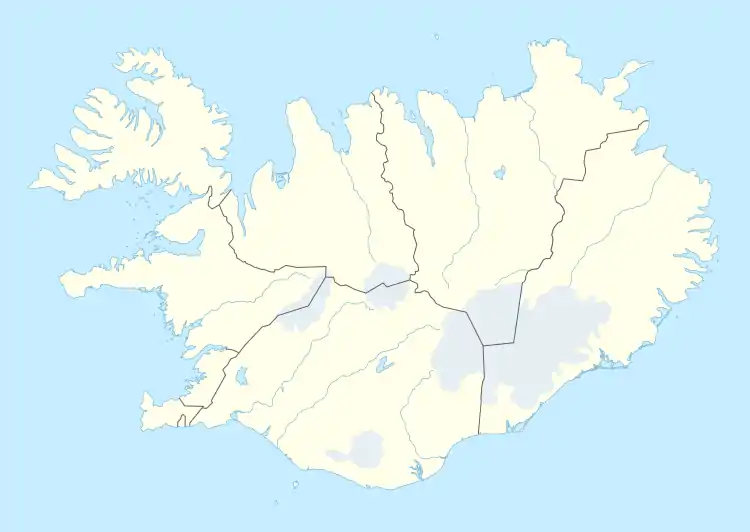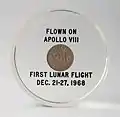The Exploration Museum
The Exploration Museum (Icelandic: Könnunarsögusafnið) is dedicated to the history of human exploration, from the early explorers to the exploration of space. The museum is located in the center of Húsavík in North Iceland, 50 kilometres (30 mi) from the Arctic Circle.[1] The museum was founded in 2011 and formally opened in 2014 by the President of Iceland.[2][3]
 Location within Iceland | |
| Established | 2011 |
|---|---|
| Location | Húsavík, Iceland |
| Coordinates | 66.047859°N 17.344387°W |
| Type | History museum |
| Director | Örlygur Hnefill Örlygsson |
| Curator | Francesco Perini and Giuditta Gubbi |
The main exhibition room features photographs and artifacts from the Apollo astronaut training program near Húsavík in 1965 and 1967.[4] The second exhibition room features the history of Viking exploration. Upstairs is dedicated to the exploration of the polar regions and the races to the north and south poles. The basement details expeditions which travelled underground and beneath the sea.[5]
Main exhibition rooms
Apollo astronaut training in Iceland
The Exploration Museum opened its first exhibition in May 2011, detailing the Apollo geology training in Iceland in 1965 and 1967. The exhibition was opened 50 years after US president John F. Kennedy first announced the goal of landing a man on the Moon by the end of 1969. The geology field exercises were intended to develop the astronauts observational skills in recognizing basic geologic structures. Over 50 photographs from the field training are in the museums collection.[6] In the words of Phinney, "Iceland was probably the most Moon-like of all the field areas that were visited." [7]
In 2015, on the 50th anniversary of the first Apollo geology field trip to Iceland, the museum organized a return trip to the training area with three Apollo astronauts, Walter Cunningham of Apollo 7, Rusty Schweikart of Apollo 9, and Harrison Schmitt of Apollo 17. On the same occasion, Neil Armstrong's grandchildren unveiled The Astronaut Monument outside the museum, honoring the astronauts that trained in Iceland. [8] The museum had previously been visited by Apollo 8 astronaut, William Anders, and SkyLab and Space Shuttle astronaut Owen Garriott.[9]
Viking explorers
The Viking explorers exhibition details the history of Viking exploration and settlement. Among the items on display are portraits of some of the most known Viking explorers, including Leif Ericson, Erik the Red, Guðríður Þorbjarnardóttir and Garðar Svavarsson.[10]
Race to the South Pole
The first expedition to reach the geographic South Pole was led by the Norwegian explorer Roald Amundsen. He and four others arrived at the pole in December 1911, five weeks ahead of a British party led by Robert Falcon Scott as part of the Terra Nova Expedition. Photographs from the two expedition and replicas of equipment used by the explorers are among the items on display. Amundsen and his team returned safely to their base. Scott and his four companions died on their return journey.[11][12]
Gallery
 Apollo 17 Moon rock on display at The Exploration Museum.
Apollo 17 Moon rock on display at The Exploration Museum. One of the exhibition rooms at The Exploration Museum.
One of the exhibition rooms at The Exploration Museum. Icelandic coin flown to the Moon on Apollo 8.
Icelandic coin flown to the Moon on Apollo 8. Apollo 8 astronaut Bill Anders training in Iceland in 1967.
Apollo 8 astronaut Bill Anders training in Iceland in 1967.
See also
References
- "The Exploration Museum (Icelandic)". explorationmuseum.com. Retrieved 2013-10-30.
- "Archeology and Astronauts in North Iceland Museum". Iceland Review. Retrieved 2014-06-28.
- "The President of Iceland opens the new Exploration Museum (Icelandic)". Morgunblaðið. Retrieved 2014-06-28.
- "Apollo Astronaut Training in Iceland". goIceland.is. Retrieved 2013-10-30.
- "The Exploration Museum". explorationmuseum.com. Retrieved 2014-04-13.
- "Opening of Apollo Space Exhibit". explorationmuseum.com. Retrieved 2014-06-30.
- Phinney, William (2015). Science Training History of the Apollo Astronauts. NASA SP -2015-626. p. 63,65-67,189,193,222,225.
- "Apollo astronauts revisit training area in Iceland and explore a new lava flow". explorationmuseum.com. Retrieved 2015-11-01.
- "Apollo astronauts visit Iceland". Iceland Monitor. Retrieved 2015-12-06.
- "Húsavík als Treffpunkt für Wikinger, Raumfahrer und andere Entdecker". Iceland Review. Retrieved 2014-06-30.
- "Documentary: The Race For The Poles". explorationmuseum.com. Retrieved 2014-06-30.
- Amundsen's South Pole expedition